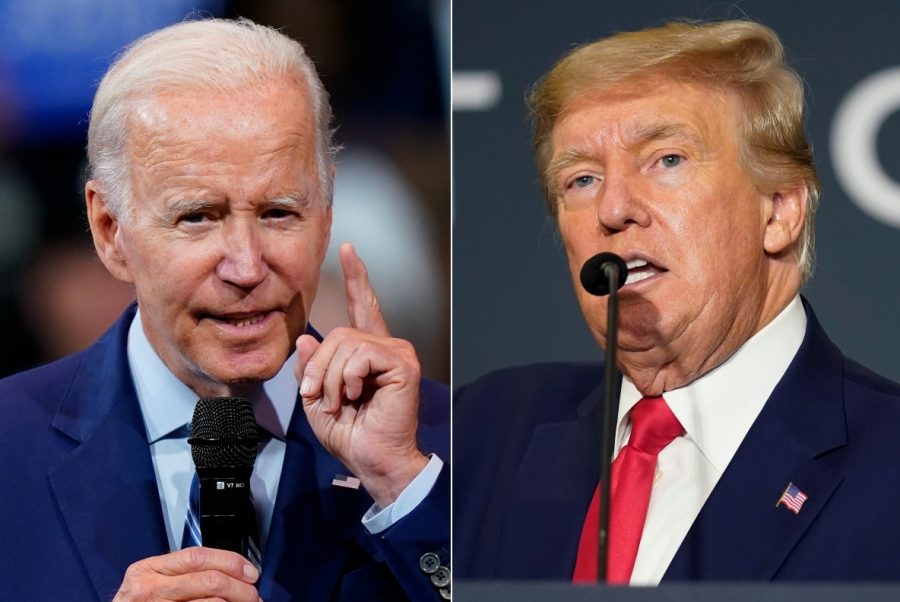An Early Overview of the 2024 Presidential Election
December 13, 2022
The 60th presidential election will take place on Nov. 5, 2024, and the inauguration of the winner will take place on Jan. 20, 2025.
There is the potential of a rematch of the 2020 election for the first time since 1956, when Dwight D. Eisenhower defeated Adlai Stevenson II, as both current president Biden and Donald Trump have said they intend to run in 2024.
Incumbent president Joe Biden is presumed to run for re-election, although he has not yet announced a reelection campaign, and former president Donald Trump announced on Nov. 15 that he would run for a second term and is currently the favorite to win the Republican nomination.
During an interview on CBS 60 minutes on Sept. 15, Biden said he hasn’t decided if he is running again. However, on Oct. 3, Biden is rumored to have revealed his intention to run for office to civil rights activist Al Sharpton in a private chat. Later, during an Oct. 11 interview with CNN’s Jake Tapper, Biden stated that he would decide after the 2022 midterm elections.
Biden’s low approval ratings in the polls at the end of 2021 led to rumors that he would not run. If this is the case, Vice President Harris and Secretary of Transportation Pete Buttigieg, both of who ran for president in 2020, could be viewed as potential candidates for the Democratic presidential candidacy.
U.S. Representatives Dean Phillips and Carolyn Maloney, as well as former U.S. Representative and 2022 South Carolina governor candidate Joe Cunningham, have all openly advised Biden not to run. Maloney later apologized and suggested that Biden should run again.
There are rumors Biden will be opposed in the Democratic Party’s primary. If Biden is not the party’s nominee, it will be the first election since 1968 in which an eligible incumbent president did not win the party’s nomination. Likewise, if he decides not to run, it will be the first election since Calvin Coolidge did not re-run in the presidential election of 1928. At 78 years old, Biden is the oldest individual to take office. By the time his first term is over, he will be 82 years old and 86 when his second term ended if re-elected.
Biden defeated Trump in 2020, but Trump is still able to run in 2024 and currently attempting to join Grover Cleveland as the second president to hold office for two non-consecutive terms. Trump announced his candidacy on Nov. 15, 2022, and is an early frontrunner for the Republican nomination.
Several things are working against Trump, some of which being the hearings held regarding the Jan. 6 hurting his reputation, Florida Governor Ron DeSantis raising more money for his campaign in the first half of 2022, and the FBI searching Trump’s Mar-a-Lago estate in 2022. Most recently, two of Trump’s companies were found guilty by a Manhattan jury on multiple charges of criminal tax fraud and falsifying business records because the companies failed to report and pay taxes on compensation.
Analysts and commentators are paying close attention, as the election in 2024 will be the first U.S. presidential election following the reapportionment of votes in the United States Electoral College following the 2020 census, and votes will remain realigned through the election of 2028. During the 2030 United States Census, the reapportionment process will be repeated, so the next time to change how the elections are processed will not be until 2030.
According to a poll by the New York Times/Sienna College on Oct. 17, 2022, Americans are most concerned about the economy and inflation rate, but that isn’t all the debate will focus on.
The COVID-19 pandemic has had significant economic consequences, which may persist into the 2024 election. Governors are considered to have received a boost in possible 2024 contention because of the high visibility they received during the pandemic, unlike senators who had previously enjoyed a significant advantage.
Having overturned Roe v. Wade, the Dobbs v. Jackson Women’s Health Organization ruling in June 2022 paved the way for U.S. states to fully ban abortion for the first time in nearly 50 years. Abortion laws will play a key role in the Republican primary with many split on the decision.
Former Vice President Mike Pence, who is also considering running for president in 2024, has called for a nationwide abortion ban, whereas other potential candidates have suggested that the matter should remain the decision of state governments.
Communities, law enforcement, and political parties have also been under increased pressure due to increases in violent crimes and gun violence, and each party is anticipated to react to rising crime rates differently come 2024.
In the 2020 presidential election, Trump refused to concede loss to Biden, alleging voter fraud. Republicans serving in the Trump administration and Congress have backed efforts to void the 2020 election. Two years later, Trump is still disputing the results.
Election security experts have expressed concerns that individuals who contested the validity of the election in 2020 will attempt to obstruct voting or refuse to certify election results. Election integrity was a contentious topic in 2022. According to the New York Times, nearly 200 “election deniers” were in office as of Nov. 9.
Although it’s early in the race, the 2024 presidential election is shaping up to be a historic election full of surprises, especially should Biden and Trump’s nominations provide the first presidential rematch since 1956.



























































